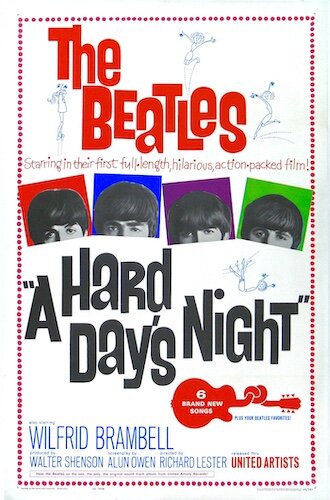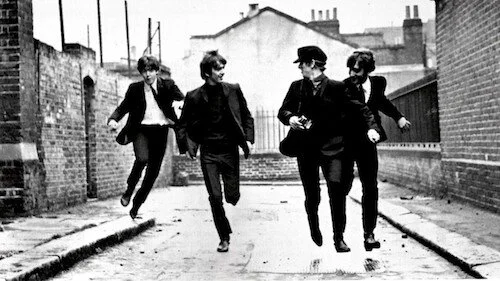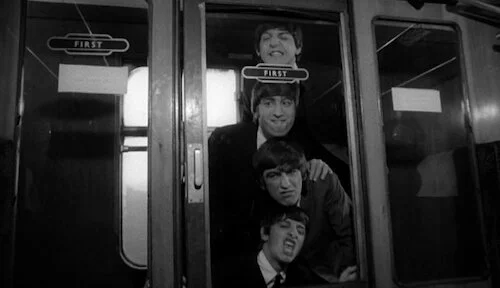A Hard Day's Night
Fifty years ago today, The Beatles broke up for good. Despite being a sombre occasion, we wish to celebrate their legacy with a review of the Richard Lester opus A Hard Day’s Night.
In 1964, The Beatles were beyond a band. They were a cultural sensation. Having started out like many other musical groups at the time, this Liverpudlian quartet originally sang the works of others. Now, we obviously know about the famous Lennon-McCartney powerhouse duo, especially for their mark on pop music that has been felt ever since. Their first album entirely written by Beatles members — no covers — was A Hard Day’s Night. The album was still in the similar vein of their two previous releases (Please Please Me and With the Beatles): straight up pop and rock standards with heavy blues influences. Their experimental period came later, with releases like Rubber Soul, The Beatles (referred to as The White Album) and Abbey Road; most of these albums from this era weren’t paired up with any form of a touring cycle, as the band had written these off by then.
So, 1964 was the perfect time for a fictional film about The Beatles to come out, in hindsight. This was before the group had to alienate themselves from screaming auditoriums and venues, and while their sound was still of a particular ilk. I know there are comparisons to The Beatles being made today insisting that they were a boy band of their time. While their earliest material may be an indication of this, I believe A Hard Day’s Night was at least the start of their diverging away from this identity, particularly because they wrote all of the songs themselves (not rare at this time [see other rock and folk musicians], but a bit of an anomaly for a band of their exact nature, especially considering how experimental they became). The film of the same name as the album was essentially a means of retaining the wholesome, sensational image the band had, and they proved their own worth heavily with (arguably) the finest album of their early, non-experimental years. It was a perfect soundtrack to go along with a film that painted the Fab Four as the most fun guys in the world.
The Beatles during the opening runaway sequence.
Part satire of the band’s milieu, and part serious opportunity to push musical films, A Hard Day’s Night is exactly like the album in film form: fun, but incredibly serious about being fun. Director Richard Lester had little legwork to do to make the film’s soundtrack better than it already is, but he had a huge task on his hands: to match the quality of these songs. The film has a very loose plot about the days in the lives of The Beatles (plus some running gag about this fictional take on Paul McCartney’s grandfather, who is a bit of a handful when he isn’t being stubbornly quiet), and these instances are an obvious exaggeration of what actually goes on. Rather than being a full-on joke about the actual rockstar lifestyle, A Hard Day’s Night incorporates other musical-comedy gags; a favourite example of mine is when the band leave the train they are riding on to purposefully chase the train alongside the passenger window, somehow with a bicycle none of them had beforehand (that kind of reality shattering that retro comedies didn’t mind breaking). Toss in homages to silent film and parodies of press junkets, and you have a silly film on your hands.
As funny as A Hard Day’s Night is, it is also a fantastic music film that pushed the boundaries of what music videos could be well before the call for music videos as a popular medium (well, as popular as they are now). It’s as if Lester knew one day that The Beatles would want to break out of their strict musical conventions, and predated their exploration with his own cinematic wizardry surrounding their songs. Each song has its own interesting set up and execution. “If I Fell” begins while Ringo Starr’s drum kit is still being assembled, and the entire song takes place while a television spot is being constructed. “She Loves You” tried to capture every single ounce of a live television concert, ranging from the panic of directors to the epiphany of super fans. “All My Loving” was about the nightlife in the music scene entirely, mostly shutting out The Beatles themselves as musicians, and featuring them as members of this society. Say what you want about the fun rambling of the plot. The musical numbers here are some of the finest ever for a few reasons. Lester achieved matching the quality of these songs. He also aimed to represent a different aspect of being a musician in every single melody. Starting off the film with the band gleefully running away from obsessive fans is the only way it could have started: with the marriage of their songs and real life woes, shot in a way to open up a playful film that celebrated music right.
The Beatles pulling faces on a train’s door.
Part screwball, part musical, and all parts uplifting, A Hard Day’s Night is one of those films that couldn’t have dropped at a better time. Before the schism between bandmates, and bad blood pouring out onto releases (their best releases, mind you), The Beatles was an unbreakable entity. They couldn’t be separated from each other, the history of music, and the world. Slowly but surely, that all went away. The band stopped touring and became a studio-only group. The band split very sourly, with various members making musical and public digs at one another. This was before all of that. This was the start of the Lennon-McCartney era, in the hub of their zeitgeist years. Let’s be honest. Any film of this nature about The Beatles (The-Freaking-Beatles) could have been phoned in and done sloppily. Nope. Richard Lester made sure this film was meant to last. As a result, we have segments like the" “And I Love Her” sequence which I can’t even write about. I’m just going to show you it, and leave the review at that.
How’s that for the perfect connection between sound and vision?
Andreas Babiolakis has a Masters degree in Film and Photography Preservation and Collections management from Ryerson University, as well as a Bachelors degree in Cinema Studies from York University. His favourite times of year are the Criterion Collection flash sales and the annual Toronto International Film Festival.







